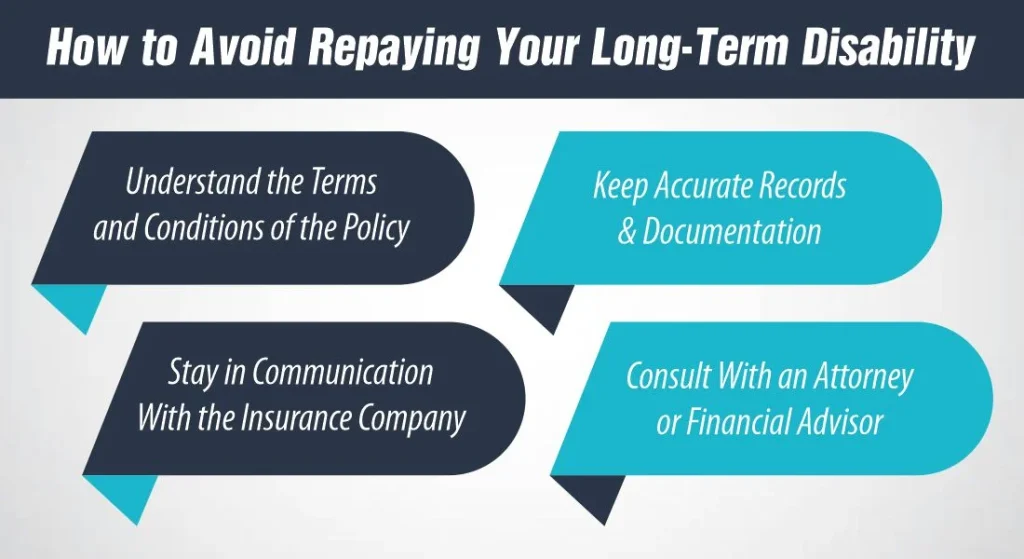Long term disability insurance overpayment happens whilst an insurance organization will pay greater advantages to a policyholder than they’re truly entitled to acquire, in line with the phrases in their incapacity coverage. This scenario can arise because of errors in calculating the advantage quantity, delays in processing changes within the policyholder’s earnings or, incapacity, or maybe from receiving duplicate bills. When an overpayment is identified, the coverage agency will be searching to recover the extra finances, regularly leading to a complex scenario for the recipient, who can also have already spent the cash now, not knowing it turned into an overpayment. Understanding how overpayments occur and what steps to take in case you’re affected is vital for managing your lengthy-time period disability blessings correctly.
What happens After An Overpayment ?
After an overpayment is recognized in lengthy-term disability coverage, several steps are generally taken via the coverage organization to clear up the state of affairs, and it’s vital for the policyholder to apprehend what to anticipate and how to respond. Here’s what occurs:
- Notification: The first step is for the coverage organization to notify the policyholder of the overpayment. This notification needs to indicate the amount overpaid, the purpose for the overpayment, and commands on the way to continue. It’s crucial to study and apprehend this verbal exchange carefully.
- Repayment Plan: The coverage organization will normally try to find compensation for the overpaid amount. Many companies are willing to work with policyholders to set up a repayment plan that doesn’t cause undue economic trouble. This would possibly encompass adjusting future benefit payments or establishing a schedule for direct compensation.
- Dispute Process: If you consider the overpayment declaration inaccurate, you commonly have the right to dispute it. This system entails presenting documentation and evidence to guide your case, such as medical records or proof of income. It’s critical to behave inside any closing dates and observe the insurer’s procedure for disputes.
- Impact on Future Payments: Until the overpayment trouble is resolved, it could impact your future gain payments. In a few instances, the insurer may lessen the amount of your monthly advantage to gradually recover the overpaid funds.
- Legal Implications: In cases where overpayments are not resolved through reimbursement or disputes, there will be legal implications. However, felony action is commonly considered an ultimate inn, and insurers commonly favour settling subjects at once with policyholders.
- Advice and Support: Policyholders should seek advice from a financial advisor or legal expert who specializes in incapacity coverage. These specialists can offer guidance on coping with the Long term disability insurance overpayment, negotiating with the insurance organization, and understanding their rights and responsibilities.
Understanding these steps permits you to navigate the method more correctly if you ever find yourself managing an overpayment on your lengthy-term disability insurance. It’s essential to act immediately, speak brazenly with your insurer, and seek expert recommendations when necessary.
Situations in which long term disability insurance overpayment is likely to arise?
Long term disability insurance overpayment provides important economic help to people unable to paint due to incapacity. However, conditions can get up in which the insurance agency pays greater advantages than it should, leading to what is referred to as an overpayment. Understanding the situations in which overpayments are likely to occur helps policyholders navigate those complex conditions. Here are 3 not unusual eventualities:
1.Overpayment because of VA Benefits
Veterans who are receiving long-term disability insurance blessings might also be eligible for benefits from the Department of Veterans Affairs (VA). If a policyholder begins receiving VA blessings after their LTD benefits have begun, the quantity acquired from the VA may cause an adjustment within the LTD blessings. Insurance regulations often have clauses that reduce the insurer’s payout through the amount acquired from different assets, including VA advantages. If this reduction isn’t immediately implemented, it may bring about an overpayment that the veteran will want to repay.
2.Overpayment because of an Award of Social Security Disability Benefits
Similarly, if a policyholder is awarded Social Security Disability Insurance (SSDI) blessings, the quantity they get hold of from SSDI, can also also result in a reduction of their LTD benefits. Insurance companies typically require policyholders to use for SSDI, and the regulations are often designed to supplement SSDI blessings, no longer duplicate them. When SSDI blessings are awarded retroactively, the policyholder may obtain a lump sum that covers beyond months or even years, all through which they have also been receiving LTD advantages. The insurance enterprise may additionally then claim an overpayment for the period covered by the SSDI retroactive price.
3.Overpayments Because of Calculation Mistakes
Errors in calculating gain amounts also can result in Long term disability insurance overpayment. These mistakes can arise for several reasons, such as wrong information about the policyholder’s pre-disability income, mathematical mistakes, or misinterpretation of the terms of the coverage. Calculation mistakes can cause the policyholder to receive extra money than they’re entitled to under the phrases of their coverage. Once these mistakes are recognized, the coverage organization will search for ways to recover the overpaid amounts.
How Do I Know If I Have to Pay Back an Overpayment?
To decide when you have to pay again an Long term disability insurance overpayment , you ought to take several steps:
- Read the Overpayment Notice Carefully: The notice should explain why the overpayment happened and the quantity the insurance agency believes you owe. It’s a formal conversation indicating that they count on repayment.
- Consult Your Insurance Policy: Your coverage documents define the phrases and conditions associated with overpayments, consisting of situations underneath that you’re required to repay any excess quantities acquired. Understanding these terms is important.
- Verify the Accuracy of the Overpayment: Before taking any action, ensure that the overpayment declaration is accurate. Mistakes can take place, whether because of calculation mistakes, misinterpretation of your insurance, or wrong records regarding your different advantages.
- Understand the Reason for Overpayment: Common reasons encompass calculation errors, receipt of different disability blessings (like SSDI or VA advantages) that were not accounted for, or changes for your profits or disability status. The nature of the overpayment might affect your obligation to repay.
- Seek Professional Advice: If you’re uncertain about the validity of the overpayment or your responsibility to repay, consulting with a financial advisor or a lawyer who specializes in disability insurance can provide readability. They can offer steering based on the specifics of your scenario and the applicable laws.
- Communicate with Your Insurer: If after your overview, the overpayment declaration seems legitimate, or if you have worries, reach out to your insurance company. You can discuss the overpayment, verify info, and discover options like a compensation plan if vital.
Your obligation to repay an overpayment depends on the terms of your insurance policy and the circumstances of the overpayment. Taking these steps can help you understand your situation and decide how to proceed.
What If I Don’t Have the Money to Pay Back an Overpayment?
Facing an Long term disability insurance overpayment while you don’t have the funds to repay can be daunting. However, there are steps you may take to control the situation:
- Communicate with Your Insurer: As soon as you recognize repaying the overpayment is beyond your financial attain, touch your coverage enterprise. Explain your situation sincerely and offer any documentation that could support your case.
- Request a Repayment Plan: Ask if you could repay the overpayment in smaller, extra conceivable installments. Insurance organizations are often inclined to barter a repayment plan that suits your finances.
- Negotiate the Amount: In a few instances, you’ll be able to negotiate the full amount owed. This isn’t always possible, but it is really worth discussing with your insurer, especially if repaying the whole amount might cause considerable economic hassle.
- Seek Professional Advice: Consider consulting with a monetary consultant or a legal professional who specializes in incapacity benefits. They can offer steering and assist you in discovering all available alternatives, inclusive of any legal protections you may have.
- Understand the Consequences: Be aware of how non-compensation may affect your future blessings. Some insurers may also deduct the overpaid amount from Destiny bills, so it’s essential to understand those potential effects.
 How to Avoid Repaying Your Long-Term Disability:
How to Avoid Repaying Your Long-Term Disability:
Avoiding the need to repay benefits out of your lengthy-time period disability (LTD) insurance begins with a proactive and knowledgeable approach to managing your policy and blessings. Here’s how you can guard yourself:
Understand the Terms and Conditions of the Policy
Familiarize yourself with the specifics of your LTD policy, particularly the sections detailing overpayment situations and compensation obligations. Knowing these phrases helps you understand what moves could possibly result in overpayments and how to avoid them.
Keep Accurate Records and Documentation
Maintain distinct statistics of all communications with your coverage corporation, bills received, and any associated documents, along with clinical statistics and correspondence about your incapacity reputation. Accurate documentation can function as proof in disputing any ability overpayment claims.
Stay in Communication With the Insurance Company
Promptly tell your insurer of any adjustments in your situation, employment status, or income, including the receipt of other benefits like Social Security Disability Insurance. Regular updates can prevent misunderstandings, which can result in overpayments.
Consult With an Attorney or Financial Advisor
Seek advice from professionals with know-how in incapacity insurance and economic making plans. A legal professional can assist you in recognizing your criminal rights and duties. At the same time, a monetary consultant can help in dealing with your blessings and finances effectively to keep away from capability overpayment problems.
By taking those steps, you could reduce the danger of overpayments and the subsequent burden of reimbursement, ensuring your LTD advantages offer the support you need without any financial complications.
Conclusion:
As we wrap Long term disability insurance overpayment and how to cover it. You can discuss the overpayment, verify info, and discover options like a compensation plan if vital.
Your obligation to repay an overpayment depends on the terms of your insurance policy and the circumstances of the overpayment. Taking these steps can help you understand your situation and decide how to proceed.

Meet Haider, our expert Life Insurance Content Writer and Editor. With a passion for clarity, he simplify the complex world of life insurance, delivering informative, polished content tailored to our clients’ needs.







 How to Avoid Repaying Your Long-Term Disability:
How to Avoid Repaying Your Long-Term Disability: